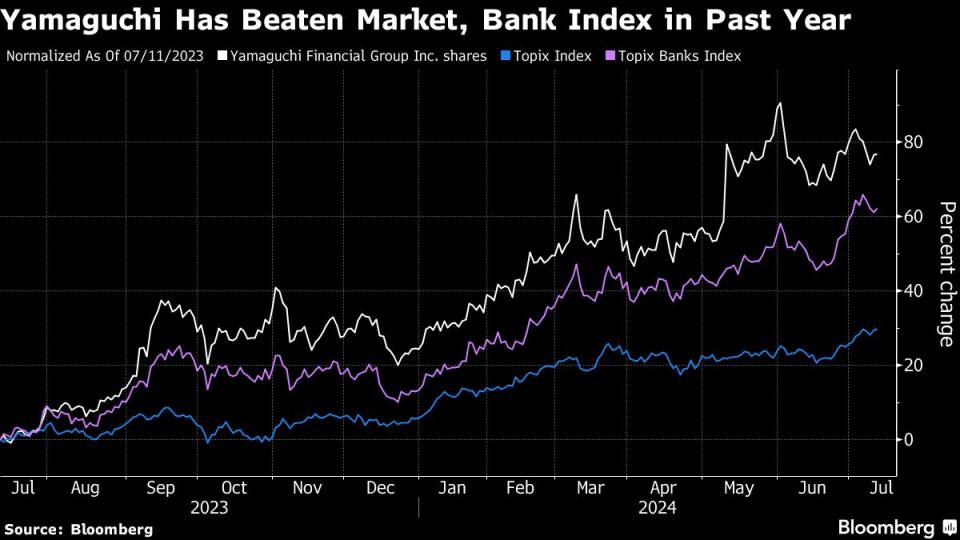Regional Japan Lender Dangles Megabank Pay for Market Hires
(Bloomberg) -- Yamaguchi Financial Group Inc., a regional lender headquartered on the western tip of Japan’s biggest island, is considering paying new hires with securities market expertise around the same compensation as staff at the nation’s largest banks.
Most Read from Bloomberg
Saudis Warned G-7 Over Russia Seizures With Debt Sale Threat
Archegos’ Bill Hwang Convicted of Fraud, Market Manipulation
Modi’s Embrace of Putin Irks Biden Team Pushing Support for Kyiv
NATO Singles Out China Over Its Support for Russia in Ukraine
Competition among financial institutions to hire bond traders and other specialists is intensifying as the Bank of Japan nudges interest rates higher, which is increasing trading volatility and opportunities for market professionals.
Salaries offered for bond and foreign exchange trader and sales jobs at the biggest Japanese banks top out around ¥13 million ($80,500) on recruitment websites including doda and Kotora.
“We don’t want compensation to be an obstacle” in trying to hire market specialists, Keisuke Mukunashi, the bank’s chief executive officer, said in an interview. “We’re ready to pay” compensation comparable to that of Japan’s biggest banks, he said.
Japan’s local banks are seeking revenue from securities investment as a shrinking and aging population weighs on business opportunities in their regions. But a dearth of expert market players at the banks raises the risk of investment losses.
Regional lenders in Japan have been hiring more mid-career staff for their market divisions, said Rikako Onishi, president of Kotora Co., a Tokyo-based recruitment firm.
“Given the recent big moves in currency and rate markets, there are many banks that have booked losses in their market businesses and they need to rebuild their asset-liability management operations,” Onishi said. “It was a world without interest rates the last 20 years, so there’s only a limited number of people with experience dealing with rates.”
A report from Japan’s financial regulator last year also underscored those views, saying that regional banks need to increase experienced people that can respond to the effects of rising interest rates. Market-related staff made up just 2% of employees at the lenders it surveyed, according to the Financial Services Agency report.
The nation’s banking sector has seen investment fiascoes at a couple of firms this year. Aozora Bank Ltd. booked its first loss in 15 years when it lost money on foreign bonds and soured US office property loans. Norinchukin Bank shocked global markets by saying last month it would sell $63 billion of low-yielding US and European government bonds that had become unprofitable.
Yamaguchi Financial itself posted a ¥13 billion net loss in the fiscal year ended March 2022 after a sharp rise in interest rates in the US and Europe prompted it to sell off its holdings of foreign bonds and mutual funds. In response, it established a risk management committee that includes outside experts.
The value of its securities holdings has rebounded to about ¥2 trillion as of end-March after falling to around ¥1.34 trillion two years earlier. The bank expects a record-high consolidated net income of ¥33 billion in the fiscal year started April 1, boosted by strong lending revenues and improved investment income on securities.
Securing human resources is a common challenge for Japanese financial institutions, but it’s especially difficult for regional lenders that need to convince potential hires to move out of big cities. Yamaguchi Financial is based in Shimonoseki, a coastal city about 800 kilometers (around 500 miles) from Tokyo that’s famed for seafood including poison-containing pufferfish.
The relatively small size of regional lenders compared with big banks in Tokyo means that while employees at the top firms can specialize in one market, those at local companies may need to watch over several at once. Yamaguchi Financial has about 3,800 employees, only around 3% of the staff at Mitsubishi UFJ Financial Group Inc., Japan’s biggest bank.
The company has hired two mid-career staff from Japanese banks to work in the market division based in Tokyo. It plans to hire 85 mid-career workers in areas including markets this fiscal year, in addition to 152 new graduates it employed in April—the traditional way big Japanese companies hire staff.
“In the future, we would like to bring the ratio of mid-career and new graduate hires to an even level,” Mukunashi said. The bank will give the timing for achieving the goal in its next mid-term plan, starting in April.
(Adds comment from recruitment firm’s president and material from an FSA report.)
Most Read from Bloomberg Businessweek
At SpaceX, Elon Musk’s Own Brand of Cancel Culture Is Thriving
Ukraine Is Fighting Russia With Toy Drones and Duct-Taped Bombs
©2024 Bloomberg L.P.

 Yahoo Finance
Yahoo Finance 









